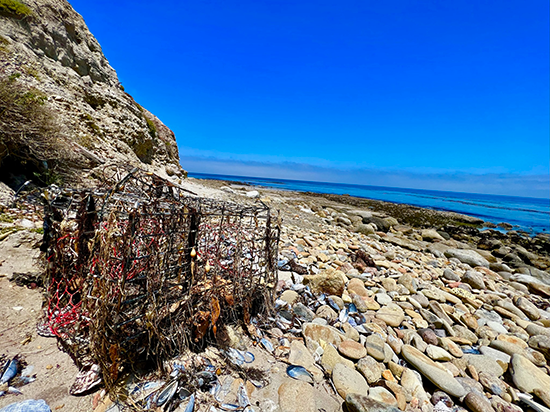NOAA Presented at the 10th California Islands Symposium
NOV. 20, 2023 — On November 7th, the NOAA Marine Debris Program California Regional Coordinator, Christy Kehoe, presented at the 10th California Islands Symposium. This multi-day event included the latest research in all disciplines of natural, environmental, and cultural science on the California Islands. This unique area includes all of the islets, rocks, and islands off the Pacific coast of California and Baja California, Mexico.

Since 1965, this Symposium has aimed to address the variety of complex environmental, sustainability, cultural, and historical issues found across the California Channel Islands. The 10th California Islands Symposium served as an opportunity for key stakeholders and managers to discuss and address these threats and potential solutions. It is also an important forum to highlight the extensive ongoing efforts and successes to restore, protect, and sustain the marine and terrestrial ecosystems unique to the California Islands.
Overall, several hundred participants attended daily plenaries, topical sessions, and poster night. On day two of the event, over 100 attendees joined the marine management session, where Kehoe presented her abstract Channeling Conservation Across California’s Islands: One Lobster Trap, Balloon, and Piece of Plastic at a Time. During her presentation, she highlighted the NOAA Marine Debris Program’s work impacting and benefiting islands across California. During the presentation, participants learned about the MDP collaborative projects and how they address marine debris, its sources, and its impacts on California Channel Islands and the nearby mainland. Kehoe highlighted the importance of partnerships including those with local and state efforts including California’s Ocean Protection Council, National Marine Sanctuary Foundation, California State University Channel Islands, University of California Riverside, NOAA Office of National Marine Sanctuaries, NOAA Channel Islands National Marine Sanctuary, and other local partners on the ground.
Other presentations cover a wide scope of subjects including marine and terrestrial ecology, biology, botany, history, archeology, geology, oceanography, and climatology. Speakers discussed multiple climate stressors, including warming oceans, introduced species, pollution, and resource extraction are impacting marine and island ecosystems. Events like the California Islands Symposium strengthen the cross-sector relationships that make it possible to support vital ecosystems amid so many intersectional threats.
